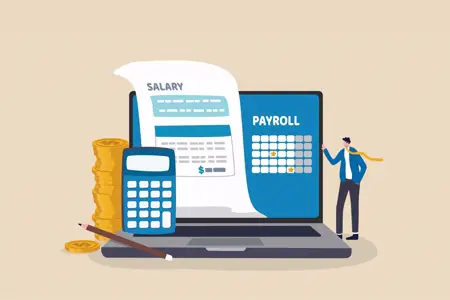Unlocking the Perks of 13th Month Pay: What You Need to Know
Employees all throughout the world are concerned about their financial security. The cornerstone of financial security is a regular monthly salary, but many employers provide their staff members a little extra boost through various bonuses and incentives.
The "13th-month pay" is one such financial perk that goes by many names around the world. This in-depth article from Aniday will cover all you need to know about 13th-month pay, including its definition, methodology, tax ramifications, and more.

1. What Is 13th Month Pay?
The idea of a "13th month pay" is a well-known tradition that gives workers extra money beyond their usual annual income in many different nations. The exact amount can vary, although this additional payout is frequently comparable to one month's worth of wages.
The 13th month pay, often referred to simply as "13th pay," is an additional financial benefit provided to employees. It is typically granted on an annual basis and serves as a supplement to their regular monthly salaries. While it often mirrors a full month's salary, the exact amount can be influenced by company policies, labor agreements, or employment contracts.
2. What Is 14th Month Pay?
While the concept of a 13th month pay is widely recognized, in some countries, there's an additional practice known as the "14th month pay." This concept closely mirrors that of the 13th month pay but provides employees with yet another month of additional income.
The 14th month pay, as the name suggests, is a concept that extends the principles of the 13th month pay. It represents an additional month of salary beyond the regular annual income of employees. In essence, it's an extra form of compensation that is intended to provide financial support and recognition.
3. Is 13th Month Pay Mandatory?

In understanding the mandatory or customary nature of 13th-month pay, it's crucial to differentiate between countries where it's a legal obligation and those where it's more of a traditional practice. Below, we delve deeper into the distinction and offer insights into how this impacts businesses:
3.1. Mandatory 13th Month Pay
Philippines: Paying employees their 13th month's compensation is not only required by law, but also as a courtesy. Employers are required under Republic Act No. 10653 to provide their staff a 13th-month payment, which is equal to one-twelfth of their yearly basic income. Employers are required to adhere by this law since breaking it could result in legal action and penalties.
Brazil: Like the Philippines, Brazil requires a 13th pay period, also referred to as the "13th salary" or "Christmas bonus." By December 20, employers must provide workers the equivalent of one-twelfth of their annual income. There may be legal repercussions if this legal requirement is not followed.
Colombia: According to Colombian labor standards, companies are required to give their employees a "Aguinaldo," or 13th-month bonus. This incentive is based on an employee's typical monthly compensation and is due by February 20 of each year. Penalties and legal problems may result from failure to comply.
3.2. Customary 13th Month Pay
In many countries, 13th-month pay is a customary practice rather than a legal requirement. In these regions, the specifics of the 13th-month pay are typically outlined in employment contracts, industry agreements, or collective bargaining arrangements. While not mandated by law, customary 13th-month pay has become an expectation, and failing to provide it can impact employee morale and retention. Examples of such countries include:
United States: The United States does not have federal legislation mandating a 13th-month pay. However, some companies may offer year-end bonuses or holiday bonuses as part of their compensation packages or as a gesture of appreciation.
Canada: In Canada, providing a 13th-month pay is not a legal requirement. Employers can choose to offer year-end bonuses or similar incentives at their discretion or as part of their employment agreements.
United Kingdom: The UK does not have a legal mandate for 13th-month pay. Instead, employers in the UK often follow their own policies and employment contracts when deciding to provide year-end bonuses.
It's important for businesses operating in regions with customary 13th-month pay to clearly outline the terms and expectations for this bonus in employment contracts or employment policies. Failing to meet these expectations can result in employee dissatisfaction and potential turnover.
In conclusion, whether 13th-month pay is mandatory or customary varies from one country to another. Employers must be aware of the legal obligations and expectations in the regions where they operate, as compliance can be a legal requirement or an important cultural practice that impacts employee satisfaction and retention.
4. Who Is Eligible for 13th Month Pay?

In locations where 13th month pay is obligatory, eligibility is primarily tied to having an employment relationship. Take the Philippines as an example, where every employee qualifies for 13th month pay, as long as they have a minimum of one month of service within the calendar year.
Conversely, in some countries and specific scenarios, certain employees may not be eligible for 13th month pay. Managers, public sector employees, and those in personal service roles might fall into this category, and these exceptions are typically outlined in local regulations.
Furthermore, employees who already receive bonuses of equal value may not be entitled to an additional 13th month pay. The same holds true for contractors and individuals on zero-hour contracts, as they usually do not receive a 13th month pay.
5. When Is 13th Month Pay Given?

Once you've determined whether your prospective hire qualifies for 13th or 14th month pay, the next crucial aspect is understanding when to disburse this additional compensation, which largely hinges on the specific country in which they are based.
The payment dates for 13th month salary are intricately tied to national regulations and local customs. Often, these payment schedules are explicitly outlined in employment contracts or collective agreements, or they may be legally mandated.
Cultural norms and traditional celebrations also play a significant role in determining the timing of these payments. For instance, in the Philippines, where the practice of 13th month pay has strong Christian roots, it must be disbursed by December 24th, perfectly aligning with Christmas festivities.
This synchronization of extra payments with cultural events is observed in several other countries. In Greece, where 14th month pay is compulsory, it is divided into two installments: one for Christmas and the other split between Easter and the summer season. Similarly, in Saudi Arabia, mandatory 13th month salaries are paid on Eid al-Fitr. In Vietnam and Singapore, 13th month pay aligns with the Lunar New Year.
By ensuring these payments coincide with important cultural and celebratory events, employees can better afford costly festivities and cherish special holidays with their families. Consequently, these timely disbursements become a pivotal component of an employee's overall compensation package. For businesses expanding globally and hiring overseas talent, being aware of these cultural and regional nuances not only enhances recruitment and retention efforts but also showcases an adaptability to local business practices, thereby fostering goodwill with local authorities.
6. How to Compute 13th Month Pay
Depending on regional laws and corporate policy, different organizations may calculate the 13th-month compensation in a different way. However, a typical method of figuring it is to divide the employee's annual base income by 12. This amount is the 13th-month compensation, which is typically equal to one month's wage.
For employees who have not worked the entire year, the 13th-month pay may be prorated based on their length of service. The formula for prorating is typically:
13th-month pay = (Total basic salary for the year) / 12 * (Number of months worked)
Remember that the specific calculation may vary, so it's important to refer to your employment contract or consult with your employer's HR department for clarity.
7. Is 13th Month Pay Taxable?

Depending on the country, the 13th-month salary may have a different tax status. It might be tax-exempt up to a particular threshold in some areas while being taxable in others. It's important to stay current with the most recent tax rules in your area because tax laws and regulations might change over time.
The 13th-month salary may occasionally be regarded as a de minimis benefit, which means it is exempt from taxation up to a predetermined cap imposed by the tax authorities. If the sum is greater than this threshold, the excess might be taxed. Both employers and employees should consult local tax authorities or seek guidance from tax professionals to guarantee compliance with tax laws.
Conclusion
In conclusion, employees may be eligible to receive the 13th-month salary at the end of the year. Although not required in all areas, it serves as a gesture of gratitude from employers, providing extra money for holiday spending and year-end costs. Review your work contract and keep abreast of local labor and tax legislation in order to fully comprehend your eligibility, the calculating process, and the tax ramifications of your 13th-month pay.
As an employer, it's a way to express your appreciation for your workforce's commitment throughout the year and as an employee, it's a pleasant boost to your financial situation. The 13th-month pay, in the end, is a prime example of the giving and receiving that characterizes the holiday season and emphasizes the significance of financial security. Aniday hopes you find this blog helpful.
Aniday's HR Services
Headhunting Service
Find and recruit quality candidates in just 1 week! Supported by 40,000 experienced headhunters in IT, Finance, Marketing… capable of recruiting in any region.
Headhunting Service ➔Employer of Record (EOR) Service
On behalf of your business, we recruit employees and handle payroll without the need to establish a company in markets such as Vietnam, Singapore, Malaysia, India, Indonesia…
Employer of Record (EOR) Service ➔